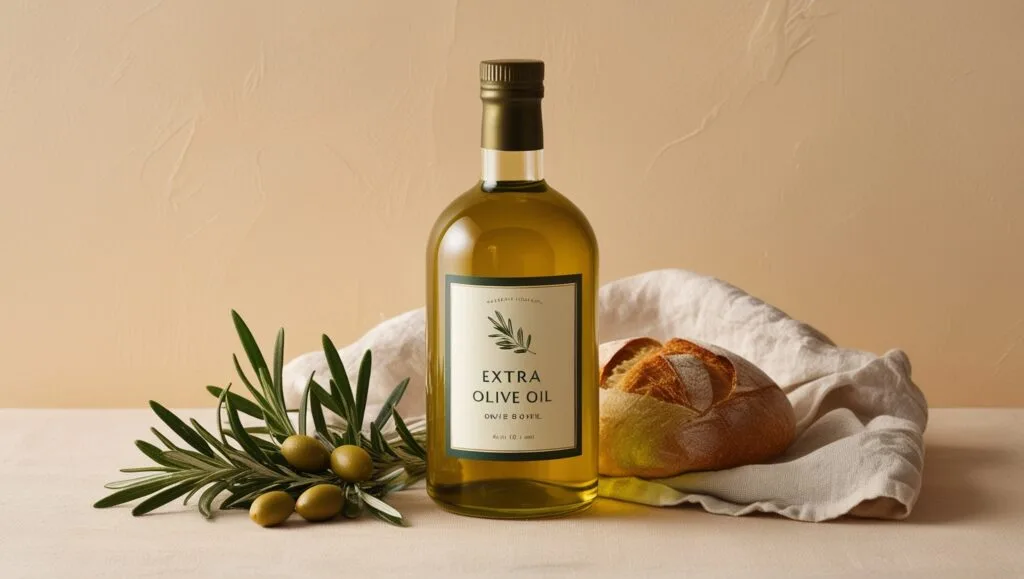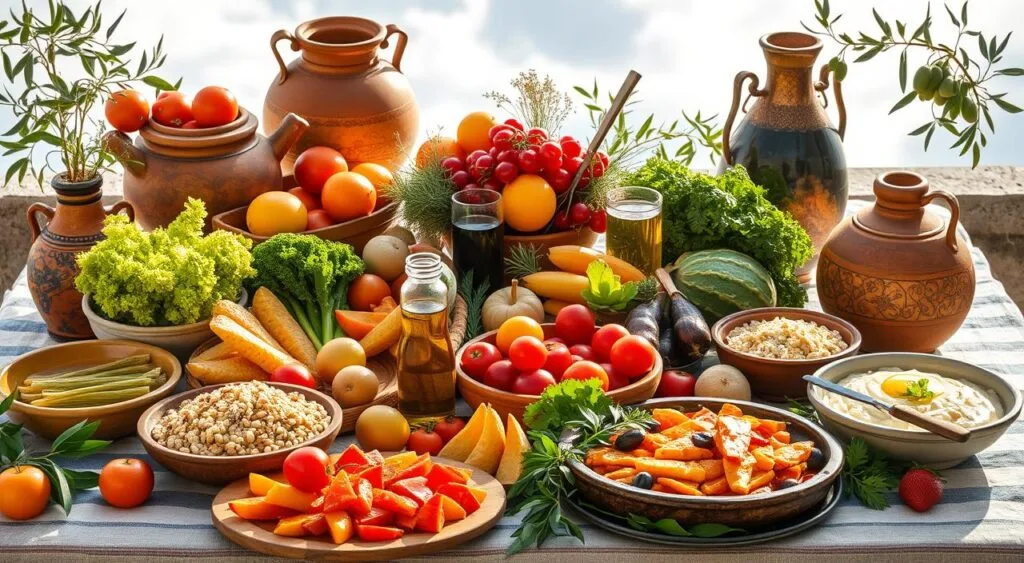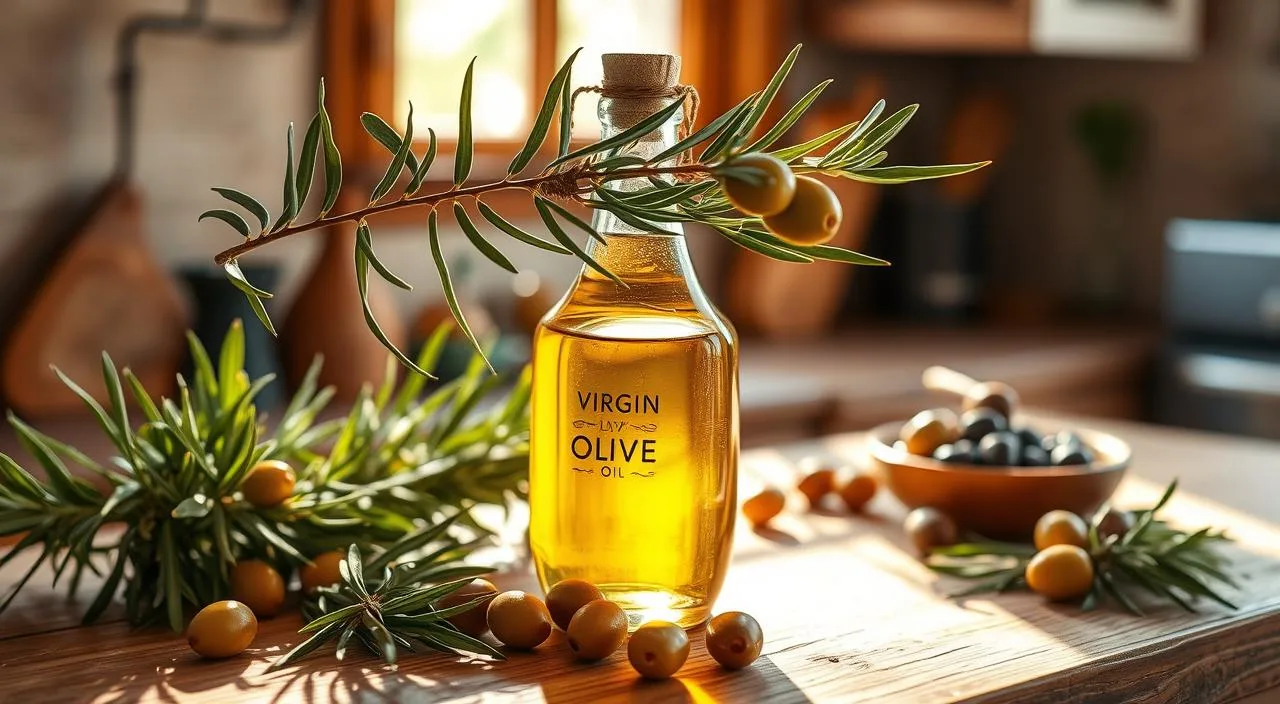Virgin olive oil is a key part of the Mediterranean diet. It’s known for its great taste, health perks, and many uses in cooking. This guide will explore the world of virgin olive oil. We’ll look at its types, how it’s made, and how it can boost your health and cooking skills.
Key Takeaways
- Virgin olive oil is a minimally processed, nutrient-rich oil with numerous health benefits.
- There are different classifications of virgin olive oil, each with unique characteristics and applications.
- Virgin olive oil’s health benefits include improving heart health, reducing inflammation, and providing antioxidant protection.
- Proper storage and temperature guidelines are essential to preserve the quality and flavor of virgin olive oil.
- Incorporating virgin olive oil into your Mediterranean-style diet can contribute to overall well-being.
Understanding Virgin Olive Oil: Types and Classifications
Exploring extra virgin olive oil and virgin olive oil reveals key differences. Both are made directly from olives without chemicals. But, their grades and making methods differ.
Extra Virgin vs Virgin Olive Oil
Extra virgin olive oil is top-notch, with better taste, smell, and health perks. It must have less than 0.8% free fatty acids and no defects. Virgin olive oil has a bit more acidity, 0.8% to 2%, and a stronger taste.
Cold-Pressed Production Methods
High-quality extra virgin olive oil and virgin olive oil often use cold-pressed methods. This process extracts oil from olives using mechanical force, without heat or chemicals. It keeps the oil’s natural taste and health benefits.
Quality Standards and Certifications
Many certifications and standards help spot genuine and quality olive oil products. The International Olive Council (IOC) and Protected Designation of Origin (PDO) labels are key. They confirm the oil’s origin, making methods, and strict rules follow-up.
“The health benefits of extra virgin olive oil are well-documented, making it a cornerstone of the Mediterranean diet.”
The Rich History of Mediterranean Olive Oil Production
Olive trees and olive oil have been a big part of the Mediterranean for thousands of years. This special oil, called “liquid gold,” is key to the area’s food, culture, and economy. It has been important since ancient times.
The history of olive oil in the Mediterranean goes back to the 8th millennium BCE. Archaeologists have found evidence of its use in Greece, Italy, and Spain. Despite changes over time, the core of making olive oil has stayed the same.
Old ways of making olive oil, like cold-pressing and stone milling, still shape the industry today. These methods keep the oil’s natural taste and smell. They also make sure the oil is of the highest quality, creating extra extra virgin olive oil.
“Olive oil has been the heart and soul of Mediterranean cuisine for millennia, its rich history intertwined with the very fabric of our cultural identity.”
Now, the Mediterranean diet, with olive oil at its core, is loved worldwide for its health and taste. The old ways of making olive oil, along with the Mediterranean’s perfect climate, keep the area’s olive oil production famous and delicious.
Essential Health Benefits of Virgin Olive Oil
Virgin olive oil is known for its health benefits. It has healthy fats, antioxidants, and polyphenols. These elements make it great for your health.
Heart Health and Cholesterol Management
The monounsaturated fats in virgin olive oil are good for your heart. They help lower bad cholesterol and keep good cholesterol levels up. This can lower your risk of heart disease.
Anti-inflammatory Properties
Virgin olive oil is full of polyphenols. These have strong anti-inflammatory effects. Eating this oil can help reduce inflammation in your body. This might help with arthritis, asthma, and some cancers.
Antioxidant Effects and Disease Prevention
The antioxidants in virgin olive oil, like vitamins E and K, fight off free radicals. This can lower the risk of diseases like Alzheimer’s, diabetes, and some cancers.
“Incorporating virgin olive oil into your diet can be a simple yet effective way to support your overall health and wellbeing.”
Nutritional Composition and Healthy Fats
Virgin olive oil is known for its great nutritional value. It’s full of healthy monounsaturated fats, like oleic acid. These fats make up to 80% of its fat content. Studies show they can lower bad LDL cholesterol and increase good HDL cholesterol.
But there’s more to virgin olive oil’s health benefits. It’s also packed with polyphenols, strong antioxidants. These include oleocanthal, which has anti-inflammatory effects. They may help prevent heart disease and some cancers.
- Virgin olive oil is high in monounsaturated fats, which can improve heart health.
- It contains polyphenols, powerful antioxidants with anti-inflammatory effects.
- The compound oleocanthal found in virgin olive oil may offer additional health benefits.
“Virgin olive oil is a true superfood, packed with an array of beneficial nutrients that can positively impact various aspects of our health.”
Adding virgin olive oil to your meals can bring many health perks. Its healthy fats and antioxidants are key to its benefits.

Cooking with Virgin Olive Oil: Temperature Guidelines
Virgin olive oil, including extra virgin and cold-pressed types, is a versatile cooking oil. It has a distinct flavor. But, knowing the right temperature is key to using it well. Let’s see how to use virgin olive oil in the kitchen.
Smoke Point Understanding
The smoke point of an oil is when it starts to smoke and break down. This happens at a certain temperature. Extra virgin olive oil has a smoke point of about 375-400°F (190-205°C). Refined olive oil, with a higher smoke point, is better for high-heat cooking.
Best Cooking Methods
For low to medium-heat cooking, like sautéing, roasting, and baking, use virgin olive oil. Its flavor and health benefits are best preserved this way. It’s great for salad dressings, marinades, and drizzling over food.
Storage and Preservation Tips
- Store extra virgin and cold-pressed olive oil in a cool, dark place, away from heat, light, and oxygen exposure.
- Opt for smaller bottles or tins that you can use up quickly to minimize oxidation.
- Keep the oil tightly sealed and avoid storing it near the stove or other heat sources.
- Refrigeration can help extend the shelf life, but the oil may become cloudy or slightly solidify, which is normal and doesn’t affect quality.
By following these guidelines, you can enjoy the unique flavor, health benefits, and versatility of virgin olive oil in many dishes.
Virgin Olive Oil in Mediterranean Diet
The Mediterranean diet is famous for its health benefits. It puts extra virgin olive oil at the center of its cooking. This diet comes from the countries around the Mediterranean Sea. It’s known for improving heart health, increasing longevity, and boosting overall well-being.
Extra virgin olive oil is a key part of the Mediterranean diet. It’s not just for flavor; it’s full of healthy fats, antioxidants, and other good stuff. This oil makes meals tasty and nutritious.
Using extra virgin olive oil in the Mediterranean diet is more than just a topping. It’s a main ingredient in many dishes, from savory meals to sweet treats. It adds a unique flavor to everything.
- In the Mediterranean, extra virgin olive oil is the main cooking fat. It replaces unhealthy oils and butter.
- It’s a must-have in pasta, legumes, veggies, and baked goods. It gives dishes a rich taste.
- The Mediterranean diet also suggests drizzling extra virgin olive oil over dishes. This lets the oil’s flavors and smells come through.
Adding extra virgin olive oil to the Mediterranean diet brings many health benefits. It helps the heart, reduces inflammation, and boosts brain function.

“The Mediterranean diet is not just a diet, it’s a lifestyle that promotes health and well-being.”
| Nutrient | Quantity in Extra Virgin Olive Oil |
|---|---|
| Monounsaturated Fatty Acids | 73% |
| Saturated Fatty Acids | 14% |
| Polyunsaturated Fatty Acids | 11% |
Adding extra virgin olive oil to the Mediterranean diet makes food taste better. It also adds to the diet’s nutritional value. This makes it a complete way to live a healthy life.
Choosing Quality Virgin Olive Oil: Shopping Guide
When picking out extra virgin olive oil, it’s key to read labels and look for certifications. Choose organic extra virgin olive oil with labels like Protected Designation of Origin (PDO) or Protected Geographical Indication (PGI). These labels mean the oil is real and made under strict rules.
Label Reading and Certification Marks
Make sure the label says extra virgin olive oil to get the real deal. Good labels will show the harvest year, where it’s from, and might even list the type, like Durant Koroneiki extra virgin olive oil. Stay away from oils labeled “light,” “pure,” or “refined” as they’re not as good.
Identifying Authentic Products
- Look for a harvest or best-by date to ensure freshness.
- Check the bottle material – high-quality extra virgin olive oil is typically packaged in dark glass or tin to protect it from light exposure.
- Avoid any oils that appear cloudy, as this may indicate impurities or adulteration.
Price vs Quality Considerations
High-quality extra virgin olive oil might cost more, but it’s worth it. It tastes better and is healthier. Look for organic extra virgin olive oil or special types like Durant Koroneiki extra virgin olive oil. With some research, you can find the best extra virgin olive oil to make your food taste amazing.
Common Myths and Misconceptions About Olive Oil
Olive oil is a complex topic, filled with myths and misconceptions. Many think the oil’s color shows its quality. But, the truth is, both extra virgin and virgin olive oils can be many colors. This depends on the type of olive, where it’s grown, and when it’s picked.
Some believe Italian olive oil is always the best. While Italy is famous for its olive oil, other countries like Spain, Greece, and Portugal also make high-quality oil. What really matters is the oil’s quality, how it’s made, and its certification, not just where it comes from.
Many think all olive oils are the same in terms of health benefits. But, the amount of antioxidants and healthy fats can differ a lot. To get the most health benefits, choose a certified extra virgin olive oil.
FAQ
What is the difference between virgin and extra virgin olive oil?
Virgin olive oil and extra virgin olive oil are top-quality oils. The big difference is in how they’re made and their acidity levels. Extra virgin olive oil is made without heat, keeping more of its natural taste and health benefits. It has less than 0.8% acidity, while virgin olive oil has between 0.8% and 2%.
What are the health benefits of consuming virgin olive oil?
Virgin olive oil is full of good fats like oleic acid. These fats can lower bad cholesterol and raise good cholesterol. It also has antioxidants that fight inflammation and may lower the risk of heart disease and some cancers.
How is virgin olive oil produced?
High-quality virgin olive oil is made by cold-pressing olives without heat or chemicals. This keeps the oil’s natural taste, aroma, and nutrients. Olives are first washed and crushed, then the oil is separated from the paste through centrifugation or pressing.
What are the different quality grades of olive oil?
Olive oil quality grades include:
– Extra virgin olive oil: The best, with less than 0.8% acidity and great taste and smell.
– Virgin olive oil: High quality, with 0.8% to 2% acidity.
– Refined olive oil: Made from lower-quality olives or treated to fix defects.
– Olive oil: A mix of refined and virgin olive oil.
How should virgin olive oil be stored for optimal freshness?
Store virgin olive oil in a cool, dark place, away from heat and light. Keep it between 57-70°F. Use a tightly sealed, opaque container to keep it fresh longer.
Is it safe to cook with virgin olive oil at high temperatures?
No, it’s not safe for high-heat cooking like deep frying. Its smoke point is around 375-400°F. For high heat, use oils like avocado or grapeseed oil instead.
How can I incorporate virgin olive oil into a Mediterranean-style diet?
Use virgin olive oil in your meals like salad dressings, over roasted veggies, or in marinades. The Mediterranean diet loves it for its healthy fats.
What should I look for when buying high-quality virgin olive oil?
Look for “extra virgin” certified bottles with a harvest or production date. Avoid clear bottles to protect the oil from light. Also, check the oil’s origin, as some places like Crete and Tuscany make great extra virgin olive oils.
Is it true that all Italian olive oils are high quality?
No, not all Italian olive oils are top-notch. Always check for specific certifications and details when buying Italian extra virgin olive oil. Regions like Tuscany and Umbria are known for their excellent oils.
